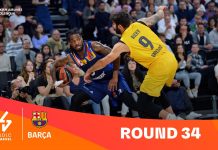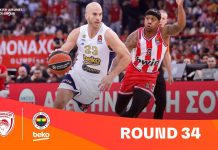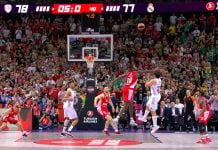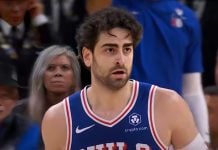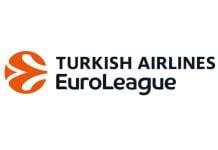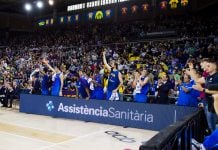From 2010 to 2016, longtime TalkBasket editor, John Hobbs was one of the very few UK-based journalists to have covered the EuroLeague Final Four, before making the move to public relations.
Here, John shares his top three EuroLeague Final Fours and the experiences that went along with it.
***
The EuroLeague Final Four is an experience to behold. The emotion, atmosphere and passion without question is unmatched.
From 2000, the showpiece event in the European club basketball calendar has provided unforgettable highlights and memories that will remain in the annals of time.
Starting with a short train ride to the Paris edition in 2010 to Berlin in 2016, I have covered the EuroLeague Final Four from six different cities across Europe, experiencing its highs and lows.
It has also opened my eyes to a different style of basketball, much different to the NBA coverage that most British sports fans are exposed to on television. The EuroLeague even attempted to advertise its brand to the niche UK market in 2013, by staging the Final Four at the 02 Arena in London in an ambitious bid to promote Europe’s finest basketball talent.
Unfortunately, with the exception of the free to enter Fan Zone, held in the heart of the iconic Trafalgar Square (all Brits love a freebie), extortionately high ticket prices, poor attendances, due to limited promotion in the London area, leading to a number of free tickets given out for the final, the event was one to forget.
However, the vast majority of EuroLeague climaxes have been memorable, and so here are my top three in no particular order.
ISTANBUL 2012: THE SHOT FROM THE BASELINE
Georgios Printezis’ baseline floater with 0.7 seconds left completed a magical EuroLeague triumph for Olympiacos against the heavily favoured CSKA Moscow.
But Olympiacos’ title victory in Istanbul felt like it meant so much more. Being in the venue that night, you could feel like you witnessed a win unlike any other.
Let’s set the scene.
EuroBasket 2011 had just ended. It was the first time that the tournament was extended from 16 nations to 24, the event was extended for an extra week and it felt like you didn’t have time to breathe before the EuroLeague season commenced.
With stars such as Andrei Kirilenko, Ramunas Siskauskas, Nenad Krstic, talent led by Alexey Shved and 2010 EuroLeague MVP, Milos Teodosic, CSKA Moscow had a near perfect balance of experience and youth in every position on their roster and apart from a few hiccups, reached the championship game as many had expected.
Olympiacos were without question the underdogs. A young team with plenty of hunger but had their fair share of struggles in certain games throughout the season.
Both teams were made to work hard to reach the final. CSKA saw-off holders Panathinaikos and Olympiacos beat Barcelona in equally close fought encounters.
With the scene set, you could have made a claim that the championship game was a modern day David against Goliath encounter. CSKA came in heavy favourites and for the majority, showed their superiority against the Reds.
Leading by 19 points in the final quarter, the Muscovites looked set to do what many thought they would do all along. The road for Olympiacos looked impossible.
But they had youth, quickness and a fight within them the size of the city they were playing in on their side.
Then a EuroLeague moment happened.
BERLIN 2016: FRENCH WIZARDERY SENT FROM RUSSIA
The German capital of Berlin is widely known for its cultural splendour, history and some seriously underrated eateries.
While on a personal level, Berlin has some of the best restaurants in Europe; it is a well-known fact that France is a utopia for general foodies.
Nando De Colo is from France. He isn’t recognized as a chef or a foodie – unless you know him personally – but in 2016, he masterminded CSKA Moscow back to the EuroLeague summit after eight years, and also ended his side’s tag as “Final Four chokers”.
Since that infamous 2012 title game, CSKA lost control in its semi-final games in 2013, blew a 15-point lead to Maccabi Tel Aviv, a year later in Milan and again a nine-point lead with less than four minutes left of their semi-final tie with Olympiacos in Madrid in 2015.
With that in mind, CSKA carried a lot of weight ahead of the EuroLeague curtain-call in 2016. And De Colo was to write his name in Final Four folklore.
A sublime 30-point showing in his side’s 88-81 win over debutants Lokomotiv Kuban finally unlocked the door to the main event, something they hadn’t been able to do since 2012. Now they wanted the title.
Standing in CSKA’s way was Fenerbahce. A team that reached their first Final Four in 2015, and would go on to EuroLeague glory in their own backyard in 2017.
For a while it looked like CSKA would ease to the championship, suffocating their Turkish counterparts to take a 21-point lead in the third and a 69-53 lead heading into the final ten minutes.
Fenerbahce didn’t back down, and kept fighting. They would put CSKA in the corner late on and memories of the last three Final Fours looked set to haunt the Muscovites again.
But with De Colo in MVP form. They have a chance. And on this occasion… they took advantage.
PARIS 2010: THE RICKY RUBIO SHOW
My first Final Four was a slight trip into the unknown. Back in 2010, the EuroLeague to Brits was non-existent. Even in 2020, it’s recognized, but still kind of an obscure sport and massively behind the NBA in terms of basketball supremacy.
One thing that was known of was a shaggy-haired, skinny 19-year-old kid by the name of Ricky Rubio.
Now a veteran combo guard in the NBA, before the 2010 Final Four, Rubio made a name for himself by becoming the youngest player to play in the ACB at just 14.
British fans knew Rubio, at age 17 by delivering a jaw-dropping show of all-round wizardry to the Guildford Heat in the ULEB Cup (now EuroCup) and his maturity at such a young age, led the sensation to Barcelona.
And in Paris, Rubio was a one-man media circus. But what amazed most was that even at his young age, his ability to let his game do the talking – throughout the media requests over the weekend – was extraordinary.
Rubio, alongside the genius of Juan Carlos Navarro and Pete Mickael, led the Catalan giants to a deserved Euroleague crown.

